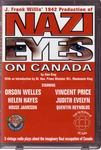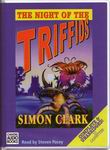
 Nazi Eyes On Canada
Nazi Eyes On Canada
Produced by J. Frank Willis; Performed by a FULL CAST
2 Cassettes – Approx 2 Hours [UNABRIDGED]
Publisher: Scenario Productions
Published: 2000
ISBN: 1894003136
Themes: / Science Fiction / Alternate History / World War II / Propaganda /
1942. From the West, from the East, the war draws near to Canadian shores. Canada is saying goodbye to her sons who are off to serve in all parts of the world. Taxes, the restrictions on unessential services, and the re-allocation of man power bring the war into the life of every Canadian. But Canadians are still living in relative luxury, and they still hold fast to the greatest of blessings – freedom. “Nazi Eyes on Canada” shows how all this would have changed in the Nazi lust for power on the North American continent had been fulfilled.
Nazi Eyes On Canada was a dramatized radio series produced by the Canadian Broadcasting Corporation (CBC Radio) during Canada’s fourth year in World War II. Its purpose was not so much to entertain as to sell war bonds, the rationale being ‘if you buy war bonds you’ll prevent the Axis powers from winning the war as depicted in these dramatizations’. The series was inspired by a German publication (contemporary to the time) written by a Nazi spy who used the alias “Colin Ross”. Ross traveled throughout Canada in the 1930s assessing the military and industrial capacity of Canada for a Nazi think tank. The purpose was to investigate first-hand the strategic requirements for an eventual North American invasion. Based on Ross’ reports, Nazi Eyes On Canada depicts exactly what such a Nazi occupation by the Third Reich would mean for the average Canadian. Broadcast over five weeks, each week looked at a particular province under the heel of the fascist jackboot: Episode 1: Ontario, Episode 2: Alberta, Episode 3: New Brunswick, Episode 4: British Columbia and Episode 5: Saskatchewan. Scenario Productions has also included a speech by then Prime Minister of Canada William Lyon Mackenzie King which serves as an introduction to the series.
This is one of the most unusual radio drama series I’ve ever heard. It puts big Hollywood stars, CBC staffers, and regular citizens together for each episode. CBC announcer Lorne Greene works with the likes of Helen Hayes, Quentin Reynolds, Vincent Price and Orson Welles! One factoid not mentioned in the liner notes of Scenario Productions’ two cassette version is that Orson Welles showed up late to the live broadcast of episode five. Welles had been at the rehearsal but at airtime he was nowhere to be found, so producer J. Frank Willis had to imitate Welles until he showed up during the third scene – something to listen for.
I found the series on the whole deeply disturbing. It was effectively scary and fascinating at the same time. But I have many reservations about it. Nazi Eyes On Canada is poorly written, jingoistic and commercial. The real life Canadian citizens (who get tell us their responses to the dramatization of their lives under Nazi occupation) read their lines woodenly. Much repetition is made with regards to the source material – to be expected I guess as they were originally broadcast a week apart. But the worst part of the experience was the blatant racism displayed during Episode 4. That episode is set in Vancouver, which in Colin Ross’ book would be given to Germany’s Axis ally the Empire of Japan, along with all lands west of the rocky mountains. So during Episode 4 we are invited to visit Vancouver under Imperial Japanese occupation. Unlike the Nazis who though are portrayed as thoroughly evil, the Japanese are painted evil by nature and are implied to be ‘a deceptive yellow race’. Such racist filth absolutely disgusted me.
But it wasn’t just this broadcast. During the time of the live airing of Nazi Eyes On Canada in 1942, widespread anti-Japanese sentiment in British Columbia led to internment of all Japanese males between the ages of 14 and 45. In 1942 Canada set up eight internment camps in the interior of British Columbia where over a nine month period 22,000 innocent Canadian Japanese were locked up for racist reasons. Make no mistake; it was racism pure and undiluted. German Canadians were not subjected to the same treatment.
So what exactly makes this science fiction?
Well for one thing Philip K. Dick’s excellent The Man in the High Castle uses the exact same premise and if that isn’t science fiction my name is J.R.R. Tolkien. The projection into the future as depicted in Nazi Eyes On Canada is an earmark of SF too. But most importantly this vintage radio drama series does what the greatest works of science fiction do; preventing the future. It’s a good thing so many Canadians bought war bonds, because expansionist fascism was defeated in no small part because of it. It is just too bad we didn’t have more science fiction dealing with racism before the Second World War. Science fiction isn’t a cure-all, but it is the vaccination against future horrors we can foresee. But you have to hear its message to be protected.
So keep listening and never forget.
Posted by Jesse Willis




